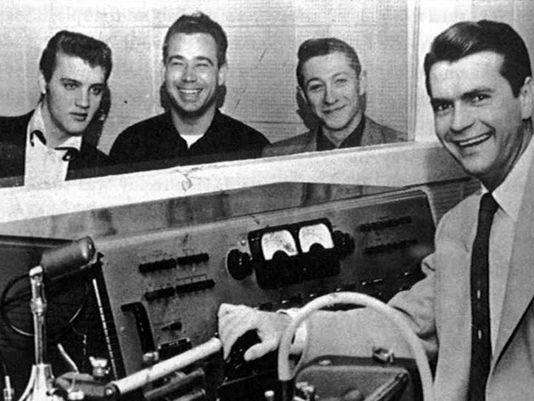60 YEARS AGO TODAY MUSIC WAS CHANGED FOREVER: ELVIS RECORDED HIS FIRST HIT
 On this day, 60 years ago — July 5, 1954 — Scotty Moore and a few of his friends changed your life and shaded almost everything you know.
On this day, 60 years ago — July 5, 1954 — Scotty Moore and a few of his friends changed your life and shaded almost everything you know.
Moore did this with two hands, six strings and a crafted wooden plank called a Gibson ES-295. He did this with an emphatic upright bass player named Bill Black; a singing, swiveling teenager named Elvis Presley; and a producer named Sam Phillips who disdained familiarity. He did this at 706 Union Ave. in Memphis. That’s where your life changed, all those years ago.
Moore is 82 now and lives in Nashville. He was 22 then, and he worked as a hatter at Memphis’ University Park Cleaners. He didn’t want to make hats for the rest of his life.
Black didn’t want to work at the Firestone Tire and Rubber Plant for the rest of his life. Presley could see some future for himself at Crown Electric, but mostly he wanted to sing. Phillips was in his 30s and was having success producing blues, R&B and country, but he sought something more: “I was looking for that damn row that hadn’t been plowed,” Phillips told biographer Peter Guralnick.
Presley had been at Moore’s house on Independence Day of 1954, running through songs — nothing special, mostly slow ballads — with Moore and Black at Phillips’ suggestion. After that uneventful rehearsal, Moore called Phillips and told him the boy had a good voice. Phillips then called for an “audition” the following evening at Sun Records, 706 Union.
The men and the boy gathered at Sun on Monday, July 5, at 7 p.m. The evening began in self-conscious discomfort as Presley stumbled through versions of pop and country songs.
Moore and Black were good enough musicians to replicate famous recordings, but Presley was raw and green and nervous.
Phillips wasn’t interested in replication. The room filled with frustration, with failure in sight. This wasn’t working. It was getting late, and early morning would mean hats and tires to make, and a Crown Electric truck to drive. The men took a break, and Presley started fooling around and banging on his guitar. If he was going to blow his big audition, he might as well act like it was no big deal.
That night, in staunchly segregated Memphis, Presley started goofing on an old blues song, “That’s All Right, Mama,” by Arthur “Big Boy” Crudup. Black jumped up and grabbed his bass, and Moore started playing some speedy guitar fills.
“Fast music was what I liked,” Moore wrote in his memoir, “Scotty & Elvis: Aboard the Mystery Train.” “For years I had been making up guitar licks for uptempo music. … It wasn’t until Elvis was flailing away at his guitar that I suddenly knew where those licks belonged.”
Turns out, those licks belonged everywhere. Phillips rushed to turn the microphones back on and captured the sound of the world’s shifting axis.
“Man, that’s good,” Moore recalls Phillips saying. “It’s different. What is it?”
That night, nobody knew the answer. Now, everyone knows. “That’s All Right” (as Phillips would title Presley’s version) was probably not the first rock ‘n’ roll song, but it was the beginning of the rock ‘n’ roll revolution and the beginning of Presley’s rise to popular ubiquity.
When Moore added his electric guitar licks to those teenage guitar strums and Black’s bass slaps, he created Elvis Presley music. In so doing, he created The Beatles and The Rolling Stones, Bob Dylan, Jimi Hendrix, Woodstock and U2. He created a subculture that soon became the mainstream and that altered everything from civil rights and politics to the ways in which we look, dress, communicate, buy and sell.
The revolution was not televised or even photographed. But Phillips met two nights later with Memphis disc jockey Dewey Phillips (no blood relation), and by Thursday, Dewey was playing “That’s All Right” on the radio and interviewing Elvis Presley. On air, he asked Elvis what high school he attended. Presley said “Humes,” which tipped listeners that he was white.
Every significant American cultural, social and musical movement of the past 60 years is colored by the sound those men and that boy created on July 5, 1954, and Moore is the only living member of that hallowed crew.
“He is the ‘Big Bang,’ and the universe he detonated is still expanding, the pieces are still flying,” wrote Greil Marcus about Elvis, and, thus, about Scotty Moore.
Moore didn’t make hats for the rest of his life. He became Presley’s first manager and toured and recorded with him for the first three years of his career.
In 1964, he moved to Nashville and released an album of instrumentals rightly called “The Guitar That Changed the World.” He has been here for the past half-century, working most of that time as a recording engineer, session musician, recording artist and tape duplication shop owner. He rarely does interviews these days, which is OK because he told his side of the story in full in the pages of “Scotty & Elvis.”
Whatever you’re doing today, Scotty Moore is a part of it. Curse him, bless him or thank him, but consider him. He invented what you now think of as rock ‘n’ roll guitar. Sixty years ago, he changed your life. (Tennessean)


